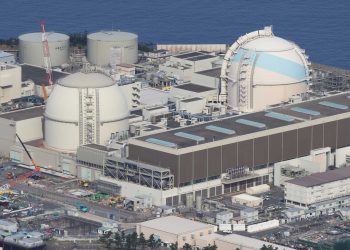,
North Korea has said it would only consider scrapping its nuclear weapons when all international sanctions against it are lifted, as disarmament talks resumed here after a 13-month break.
Declaring itself “satisfied” with becoming a nuclear power following its first-ever atomic test on October 9, North Korea offered no signs of compromise at the six-nation talks Monday, according to officials who were at the forum.
Instead North Korean chief envoy Kim Kye-Gwan called, in his opening remarks to the talks, for United Nations and US sanctions to be lifted, as well as repeating long-held demands for help in developing a nuclear power industry.
The United Nations sanctions were imposed following North Korea's historic atomic test, while the US financial restrictions were slapped on the reclusive nation late last year for alleged money laundering and counterfeiting.
The other parties to the talks — host China, the United States, Japan, South Korea and Russia — had all said they were hoping the negotiations would see the North recommit to a disarmament deal brokered in September last year.
That deal saw the North agree to give up its nuclear program in return for security guarantees, energy benefits and other aid.
“The North Koreans insisted that discussions about the implementation of the September 19 joint statement would be possible only after both the US financial sanctions and the UN sanctions are lifted,” a source who was at the opening talks said.
“The North Koreans said they would take measures to keep strengthening their nuclear deterrent as long as sanctions and pressure continues to exist.”
Kim also repeated its earlier demand that the international community help it build light water nuclear reactors, and until then provide it with oil for fuel.
“Their position was that they would not care whether others recognize them as a nuclear power or not. They said they were satisfied with the possession of nuclear weapons,” a South Korean official told reporters.
Kim said after arriving in Beijing on Saturday that Pyongyang's decision to go nuclear was because of the “hostile” US policy against it.
“The nuclear issues cannot be resolved until the United States takes a co-existence policy,” Kim said. “I'm not optimistic about prospects for the six-party talks.”
In his opening remarks, Chinese envoy Wu Dawei said the top priority this week was to discuss ways to implement the September deal.
“The issues that we will discuss at the talks are of a profound and complicated nature,” Wu said.
The chief US envoy to the talks, Christopher Hill, also said ahead of the start of negotiations that the United States would push for a North Korea to recommit to the September agreement.
“What the DPRK (North Korea) needs to do is to get serious with denuclearization,” Hill said.
According to South Korean media reports, the United States had offered the North another security guarantee signed by President George W. Bush as part of a package of incentives to tempt it into dropping its program.
While Hill has been cautious about the chances of success, US Secretary of State Condoleezza Rice said last week the United States was aiming for a denuclearized North Korea by January 2009, when Bush leaves office.
But many analysts who have closely followed the six-nation talks say North Korean leader Kim Jong-Il has no intention of surrendering the nuclear program his nation has spent decades developing.
“Now that North Korea has the nuclear bargaining chip, it is never going to give it up,” said John Feffer, the global affairs director at the US-based International Relations Center.









